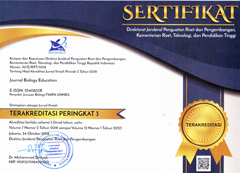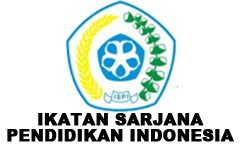PENGARUH GAMES EDUCATION (GE) TERHADAP AKTIVITAS DAN HASIL BELAJAR SISWA MATERI SISTEM PEREDARAN DARAH MANUSIA
Abstract
Abstrak
___________________________________________________________________
Penelitian bertujuan untuk mengetahui pengaruh games education (GE) terhadap aktivitas dan hasil belajar siswa pada materi sistem peredaran darah manusia. Penelitian ini merupakan penelitian true - eksperimental design tipe randomized subject posttest – only control group design dengan populasi seluruh siswa kelas VIII SMP Negeri 38 Semarang. Sampel penelitian diambil menggunakan teknik cluster random sampling yaitu mengambil dua kelas secara acak dari populasi yang homogen. Sampel yang terpilih adalah kelas VIIIB sebagai kelas eksperimen dan kelas VIIIA sebagai kelas kontrol. Variabel bebas dalam penelitian ini adalah pengaruh games education (GE)pada materi sistem peredaran darah manusia, sedangkan variabel terikatnya adalah aktivitas dan hasil belajar siswa. Nilai aktivitas dan hasil belajar siswa dianalisis perbedaan reratanya menggunakan uji-t. Berdasarkan indikator keberhasilan, apabila ada perbedaan rerata aktivitas dan hasil belajar siswa antara kelas eksperimen dan kelas kontrol menunjukan adanya pengaruh games education (GE) terhadap aktivitas dan hasil belajar siswa. Hasil penelitian menunjukan bahwa aktivitas dan hasil belajar pada kelas eksperimen lebih tinggi dibandingkan kelas kontrol
Â
Â
Abstract
___________________________________________________________________
The study aims to determine the effect of games education (GE) on the activity and student learning outcomes in the human circulatory system material. This research is true - the type of randomized experimental design subject posttest - only control group design with the entire population of eighth grade students Junior High School 38 Semarang. Samples were taken using cluster random sampling technique that is taking two classes at random from a homogeneous population. Selected sample is class VIIIB as experimental class and class VIIIA as a control class. The independent variable in this study is the influence of games education (GE) in the matter of the human circulatory system, while the dependent variable is the activity and student learning outcomes. Value activities and student learning outcomes mean differences were analyzed using t-test. Based on the indicators of success, if there are differences in mean activity and student learning outcomes between experimental class and control class games shows the influence of education (GE) to the activity and student learning outcomes.The results showed that the activities and learning outcomes in experimental class is higher than the control class.
References
Anni, CT dan A. Rifa’i. 2011. Psikologi Pendidikan. Semarang: Universitas Negeri Semarang Press.
Ariyani, D. 2013. Penerapan Pembelajaran Materi Sistem Peredaran Darah dengan Metode Simulasi Taman Sirkulasi Berbasis Bioedutainment di SMP Negeri 1 Gabus Kabupaten Pati. Unnes Science Education Journal 1 (2) (2013).
George, C & Renate, N.,C. 2006. Meaningfull learning and the Executive Functions of the Human Brain. Journal Neuroscience of Adult Learning. Pp. 53-62 [Diakses tanggal 22 Desember 2014].
Huda I. 2010. Penerapan Pendekatan JAS dengan Metode Role Playing pada Materi Sistem Peredaran Darah di SMP 10 Semarang. Unnes Science Education Journal 1 (2) (2010).
Jarvis, L.,K. Odell dan M. Troiano. 2002. Role-Playing as a Teaching Strategy. Journal for Application and Presentation. Pp. 2 [Diakses tanggal 15 Januari 2015].
Melvin l. Silberman. 2007. Active learning. Yogyakarta : Pustaka Insan Mandiri.
Mustakim, Z. 2009. Strategi dan Metode Pembelajaran. Pekalongan: STAIN Pekalongan Press.
Rustaman & Nuryani, Y. 2003. Strategi Belajar Mengajar Biologi. Bandung: Universitas Pendidikan Indonesia.
Sari, L dan Ade Rustiana. 2013. Model Bermain Peran dalam Meningkatkan Hasil Belajar pada Kompetensi Dasar Menerapkan Prinsip-Prinsip Pelayanan Prima. Jurnal Pendidikan Ekonomi Dinamika Pendidikan. Vol. VIII, No. 2, Desember 2013. Hal. 101 -110.
Syafsensi, I., Syaroh, L dan Chairul, I. 2013. Kontribusi Motivasi Belajar Terhadapa Hasil Belajar Mata Pelajaran Gambar Bangunan Siswa SMK Negeri 2 Solok. CIVED ISSN 2302-3341 Vol. I, Nomor 1, Maret 2013.
Yiyu C, Lu, Zheng & Lin Li. 2006. Simulation and Gaming. Agency for Science, Technology. and Reasearch, Sage Publication. 37(4): 466-475.Online athttp://sag.sagepub.com/cgi/reprint/37/4/466.pdf (diakses tanggal 7Maret 2015)
The copyright of the article once it is accepted for publication shall be assigned to the journal as the publisher. The intended copyright includes the right to publish the article in various forms (including reprints). The journal maintains the publishing rights to the published articles.
This work is licensed under a Creative Commons Attribution 4.0 International License.







